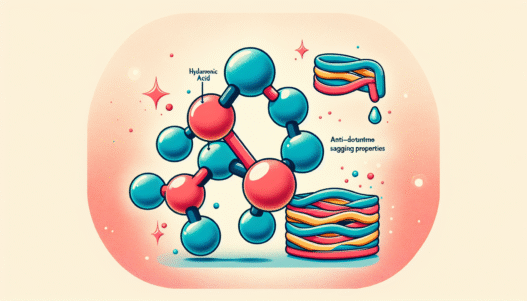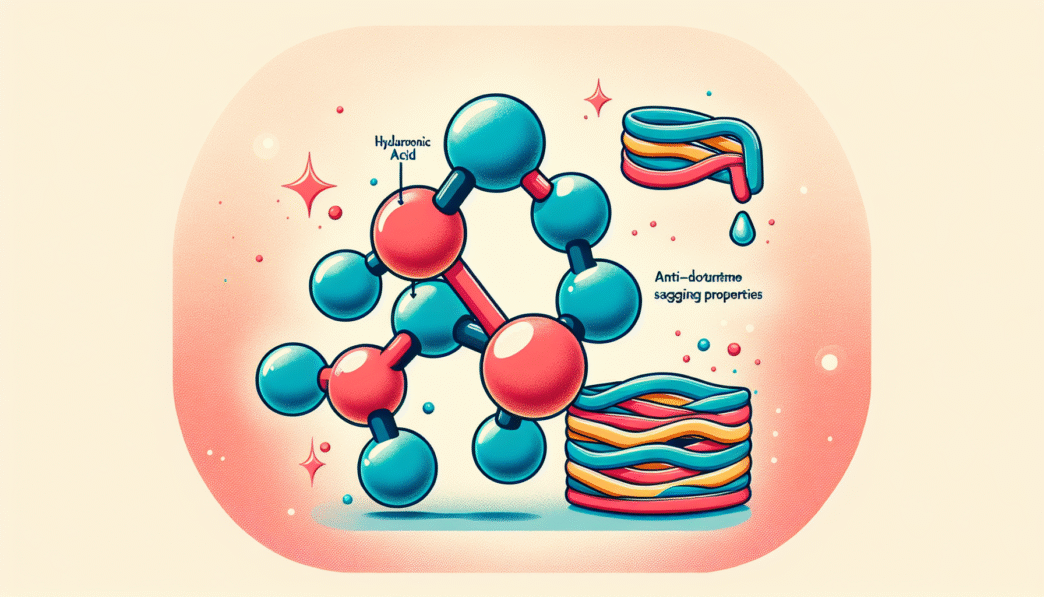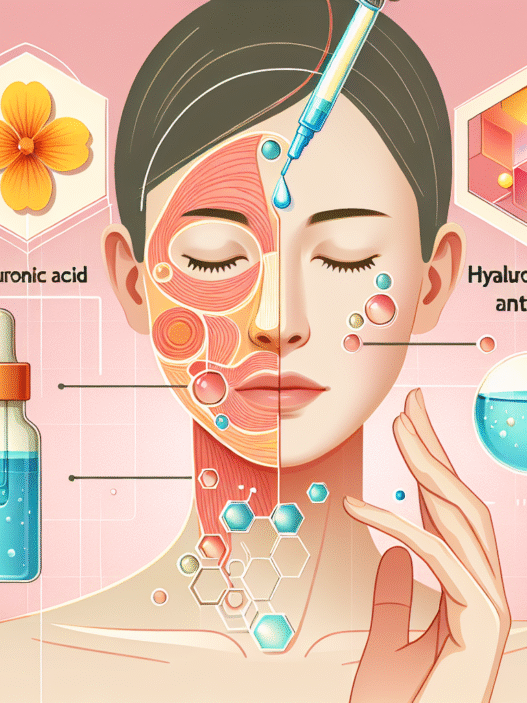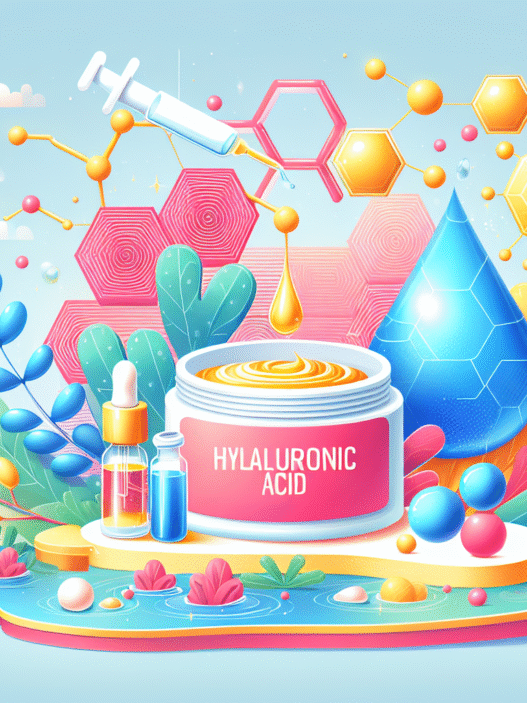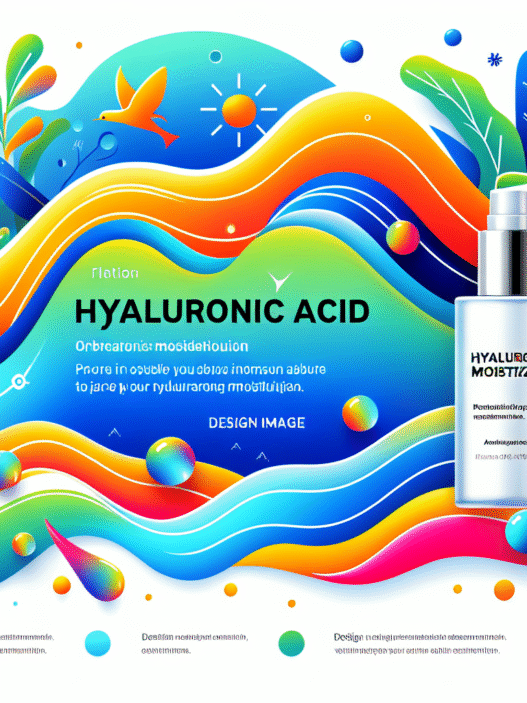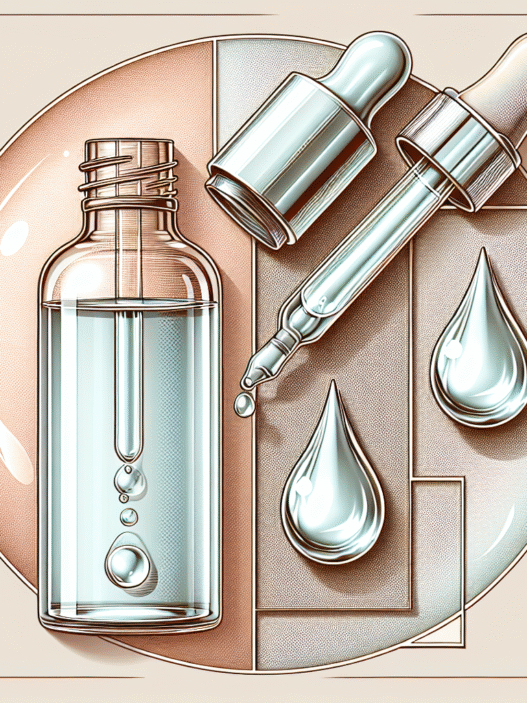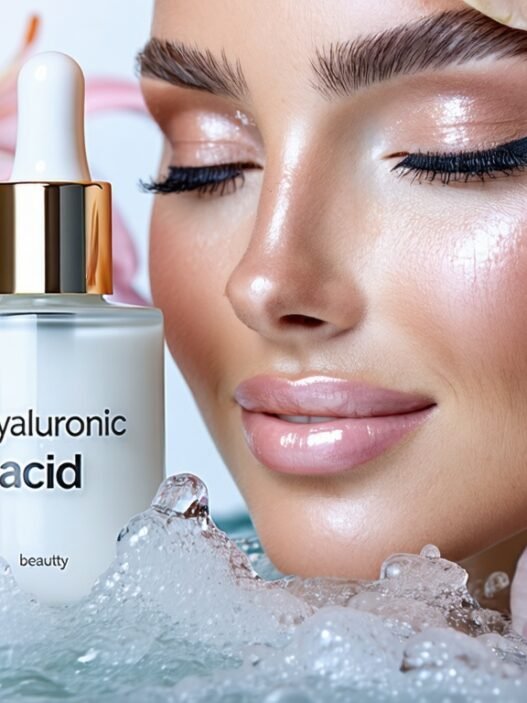Understanding Hyaluronic Acid
What is Hyaluronic Acid?
Hyaluronic acid (HA) is a naturally occurring polysaccharide found in the body, particularly in connective tissues, skin, and cartilage. It plays a crucial role in retaining moisture, as it can hold about one and a half gallons of water in a quarter-teaspoon, making it one of the most effective hydrating agents. In human skin, there are approximately 15 grams of hyaluronic acid, with a significant portion residing within the skin layers.
Hyaluronic acid is multifunctional; it helps modulate cellular immunity and absorb high amounts of water, contributing to the skin’s structure and hydration. Its unique ability to retain moisture while improving skin texture makes it a valuable component in many beauty products.
How Does Hyaluronic Acid Benefit the Skin?
The benefits of hyaluronic acid for the skin are extensive. Long-term use of HA, whether applied topically or taken as a hyaluronic acid supplement, can greatly enhance skin health, flexibility, and elasticity. This results in skin that is more stretchy and soft. Some of the key benefits include:
| Benefit | Description |
|---|---|
| Increased Hydration | A clinical study showed a significant increase in skin hydration of 134% immediately after applying HA serum. |
| Reduced Fine Lines | After consistent use, fine lines can be diminished by up to 31%. |
| Improved Skin Texture | Users reported a 60% improvement in skin smoothness and overall appearance (NCBI). |
| Enhanced Elasticity | Use of HA has been shown to increase skin elasticity by 20%, improving wrinkle depth and skin roughness. |
Hyaluronic acid works primarily as a humectant, meaning it helps bind water to the skin, maintaining optimal hydration levels. This hydration not only contributes to a plump and youthful appearance but also helps to reduce the visibility of wrinkles and sagging. Its ability to interact effectively with skin allows for improved skin firmness and rejuvenation, making it a powerful ally in anti-aging skincare routines. To learn more about specific HA products, check our sections on hyaluronic acid serum and hyaluronic acid moisturizer.
Hyaluronic Acid in Skincare
Hyaluronic acid has gained popularity in the realm of skincare due to its exceptional properties and versatility. In this section, we will explore the applications of hyaluronic acid in over-the-counter products and its role in dermal fillers used for scar treatment.
Hyaluronic Acid in Over-the-Counter Products
Over-the-counter products containing hyaluronic acid are widely available and can be found in various forms, including serums, creams, and moisturizers. These products capitalize on hyaluronic acid’s ability to bind and retain moisture, making them highly effective for hydrating and plumping the skin. Commonly used in daily skincare routines, these formulations help combat dryness and enhance skin texture.
| Product Type | Benefits |
|---|---|
| Hyaluronic Acid Serum | Deep hydration, improves skin elasticity |
| Hyaluronic Acid Cream | Locks in moisture, ideal for dry skin |
| Hyaluronic Acid Moisturizer | Lightweight hydration, suitable for all skin types |
Research indicates that hyaluronic acid can support skin health by addressing issues such as eczema and dermatitis. A study found that participants using a foam version of hyaluronic acid reported a more enjoyable experience and experienced beneficial effects compared to those using traditional creams (Medical News Today). For more details on various products, refer to our article on hyaluronic acid serum.
Hyaluronic Acid in Fillers for Scars
Hyaluronic acid is also an integral component of many dermal fillers, specifically formulated to repair or conceal scars resulting from acne and other skin conditions. These fillers can effectively restore volume to scarred areas, resulting in a smoother and more even skin texture. While the benefits of hyaluronic acid in fillers are well recognized, there exists a need for further research regarding its efficacy in combination with other treatments for acne scars.
The use of hyaluronic acid injections in aesthetic procedures can yield impressive outcomes, contributing to overall skin rejuvenation and improved appearance. For those considering treatment options, it is beneficial to understand the wide-ranging effects of hyaluronic acid on skin health. More information can be found in our article on hyaluronic acid injections.
Incorporating hyaluronic acid in skincare, whether through over-the-counter products or fillers, can significantly aid in anti-sagging strategies, promoting a more youthful and supple appearance.
Safety and Application of Hyaluronic Acid
Hyaluronic acid is a popular ingredient in many skincare products and dietary supplements. Understanding the safety and application of these products is crucial for beauty and skincare enthusiasts.
Safety of Hyaluronic Acid Products
Hyaluronic acid is generally recognized as safe for use in over-the-counter skin serums, creams, lotions, eye care products, and oral supplements, provided these products are used as directed. Prescription products containing hyaluronic acid should only be utilized under the guidance of qualified healthcare providers (Cleveland Clinic).
| Product Type | Safety Status |
|---|---|
| Over-the-Counter Serums | Safe when used as directed |
| Creams and Lotions | Safe when used as directed |
| Eye Care Products | Safe when used as directed |
| Oral Supplements | Safe when discussed with a healthcare provider |
| Prescription Products | Must be used as prescribed |
Application of Oral Hyaluronic Acid Supplements
Oral hyaluronic acid supplements are also considered safe for consumption. However, it is advisable for individuals to consult with healthcare providers regarding their use. This is especially important if a person has underlying health conditions or is on medication. Oral supplements may help in maintaining skin hydration and may contribute to overall skin health.
The benefits of incorporating oral hyaluronic acid supplements can vary among individuals but can include:
| Potential Benefits | Additional Notes |
|---|---|
| Increased Skin Hydration | May help improve overall skin appearance |
| Additional Joint Support | Often used for joint health due to its hydrating properties |
| Skin Elasticity | May aid in sustaining skin elasticity and firmness |
For detailed information on how hyaluronic acid can enhance skin care routines, consider exploring our articles on hyaluronic acid and skin care and hyaluronic acid supplements.
Hyaluronic Acid for Skin Health
Hyaluronic acid plays a vital role in promoting skin health due to its exceptional hydrating properties and ability to enhance skin flexibility. Understanding its benefits can help beauty and skincare enthusiasts make informed choices about incorporating this powerful ingredient into their routines.
Moisturizing Properties of Hyaluronic Acid
Hyaluronic acid is renowned for its remarkable ability to retain moisture. It can hold up to 1,000 times its weight in water, making it a highly effective water-absorbing polymer. This unique characteristic helps to draw water into the skin, thereby enhancing hydration levels and preventing water loss.
By functioning as a humectant, hyaluronic acid binds water molecules to the skin’s surface, leading to a well-hydrated and plump appearance. Its capacity to absorb about one and a half gallons of water in a quarter-teaspoon highlights its power in moisturizing products.
| Moisture-Absorbing Ability | Weight of Water Held |
|---|---|
| Hyaluronic Acid | Up to 1,000 times its weight |
| Sample Amount | 1/4 teaspoon holds approximately 1.5 gallons |
Impact of Hyaluronic Acid on Skin Flexibility
Hyaluronic acid not only aids in hydration but also significantly contributes to skin flexibility and elasticity. The human skin naturally contains about 15 grams of hyaluronic acid, with one-third located within the skin itself. This key molecule is crucial for maintaining skin structure and supporting cellular functions (NCBI).
As hyaluronic acid levels decrease with age, the skin can become more prone to sagging and the formation of wrinkles. By replenishing these levels through topical applications or supplements, individuals can enhance their skin’s flexibility and combat signs of aging. Maintaining optimal moisture levels helps in reducing the appearance of fine lines and improving overall skin texture.
Incorporating products like hyaluronic acid serums and hyaluronic acid moisturizers can be effective strategies to take advantage of its moisturizing and flexibility-enhancing properties, making it a staple in any anti-sagging skincare regimen.
Research Insights on Hyaluronic Acid
Research surrounding hyaluronic acid and its applications continues to grow, illuminating its essential role in skincare, particularly for anti-aging and skin rejuvenation. Ongoing studies focus on its effectiveness, tolerability, and potential benefits.
Ongoing Studies on Hyaluronic Acid
Scientists are continuously exploring innovative and beneficial uses of hyaluronic acid, which has essential applications in skin, joint, and eye health. Current research includes hundreds of scientific studies and trials globally that investigate its potential effects and various applications in dermal therapies. Notably, a 2022 review found that topical hyaluronic acid effectively aids in treating skin aging, especially following facial or surgical rejuvenation procedures. The review also noted that hyaluronic acid fillers can enhance and prolong the results of Botox injections.
Recent studies highlight the versatility of hyaluronic acid, especially in skincare, showcasing its benefits in skin hydration, texture improvement, and elasticity. One such study conducted in 2021 involved 40 women aged 30 to 65 experiencing signs of photoaging. Results demonstrated that applying topical hyaluronic acid twice daily significantly improved skin hydration, texture, and elasticity over a six-week period (Medical News Today).
Topical Applications for Skin Rejuvenation
Topical applications of hyaluronic acid have garnered considerable attention in skincare. It is praised for its ability to restore moisture and elasticity to aging skin. Notably, in a study examining a specific hyaluronic acid product known as Fillerina®, researchers found that the formulation effectively decreased signs of skin aging and enhanced facial volume, showcasing its rejuvenating properties (PubMed Central).
Hyaluronic acid is a key ingredient in numerous skincare products, such as serums and moisturizers. Its remarkable hydrating properties make it an ideal choice for those seeking to improve skin firmness and elasticity, which are crucial in addressing sagging skin. For more information on the various types of hyaluronic acid products available, explore our articles on hyaluronic acid serum, hyaluronic acid moisturizer, and hyaluronic acid cream.
This ongoing research and its findings highlight the significant impact of hyaluronic acid in the realm of skincare, particularly in aiding anti-aging efforts and promoting overall skin health.
Hyaluronic Acid for Anti-Aging
Hyaluronic acid has gained recognition in the beauty and skincare industries for its significant anti-aging properties. This component plays a crucial role in reducing the appearance of fine lines and wrinkles, while also enhancing skin elasticity.
Benefits of Hyaluronic Acid on Wrinkles
Research has shown that hyaluronic acid can notably decrease the depth of wrinkles. A 2014 study indicated a remarkable decrease of up to 40% in wrinkle depth after using hyaluronic acid topically twice daily for eight weeks (Medical News Today). This reduction in wrinkles contributes to a more youthful-looking appearance.
To illustrate the effectiveness of hyaluronic acid, the following table summarizes the findings from various studies regarding wrinkle reduction:
| Study | Study Group | Decrease in Wrinkle Depth (%) |
|---|---|---|
| 2014 Study | Topical application twice daily for 8 weeks | Up to 40% |
| Clinical Study | Application of HA serum | Up to 14% reduction in wrinkles after 6 weeks |
In addition to decreasing wrinkles, hyaluronic acid also contributes to enhancing overall skin firmness and smoothness. Regular use promotes a noticeable improvement in skin texture, making it a great addition to any anti-aging regimen.
Effectiveness in Improving Skin Elasticity
Hyaluronic acid also plays a vital role in boosting skin elasticity. In the same 2014 study, participants experienced up to a 55% increase in skin firmness and elasticity after consistent application of the acid. This improvement is crucial for those seeking to maintain a youthful appearance, as elastic skin is less prone to sagging.
Furthermore, another clinical study indicated significant results from a hyaluronic acid serum, showing improvements in skin hydration and elasticity over a six-week period. Participants reported enhancements in skin smoothness, plumping, hydration, and overall global appearance.
| Study | Study Group | Increase in Skin Elasticity (%) |
|---|---|---|
| 2014 Study | Topical application | Up to 55% |
| Clinical Study | Application of HA serum | Improvement in hydration and elasticity over 6 weeks |
By incorporating hyaluronic acid into their skincare routine, individuals can benefit from its powerful anti-aging effects. For more information on how to effectively use hyaluronic acid products, visit our resources on hyaluronic acid and anti-aging effects and hyaluronic acid benefits.










